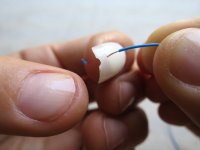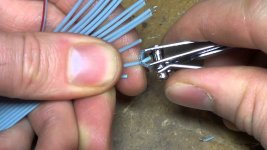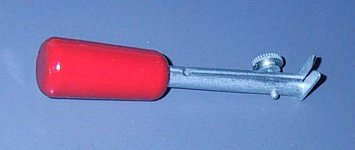Hi
I'm struggling with stripping 0.03mm stranded wires, the wire-stripper doesn't grip, and the coating is as "tough" as the wire itself, every second and third attempt I decapitate the wire...
What's your technique? a scalpel? Or is it only finesse, patience and training? (That's ok, but if there's a trick, I'd prefer to go with that )
)
Thank you for sharing!
david
I'm struggling with stripping 0.03mm stranded wires, the wire-stripper doesn't grip, and the coating is as "tough" as the wire itself, every second and third attempt I decapitate the wire...
What's your technique? a scalpel? Or is it only finesse, patience and training? (That's ok, but if there's a trick, I'd prefer to go with that
Thank you for sharing!
david
can you try to melt the plastic with heat gun?
or burn it?
sometimes I just use soldering tip to get rid of the plastic
I knew there was a better way
thanks, adason!

Knipex supply a suitable wire stripping tool. https://www.hoffmann-group.com/PT/en/hop/Gripping%2C-cutting%2C-and-impact-tools/Cable-processing/Electronics-wire-stripping-tool/p/728765-140
However, it does sound like it is the coating whch is the problem.
However, it does sound like it is the coating whch is the problem.
Here is technique I find useful for "difficult" cases, like PTFE or heat-resistant enamel:
I position the end of the wire on a small block of hard wood, and I press the tip of a soldering iron firmly against it.
I then pull the wire, and hopefully, the insulation remains on the wood and tip.
If it doesn't work first time, you can repeat the attempt, as the metallic core won't be damaged
I position the end of the wire on a small block of hard wood, and I press the tip of a soldering iron firmly against it.
I then pull the wire, and hopefully, the insulation remains on the wood and tip.
If it doesn't work first time, you can repeat the attempt, as the metallic core won't be damaged
A 0.03mm wire has a tiny heat capacity compared to its surface/dissipating capacity, and if the heating and stripping are dissociated, even by a small time amount, it will cool down before you have realistically the time to proceed with stripping.
Burning the insulation completely (followed by chemical stripping to remove oxides) could be an option, but with insulations like PTFE it could be hazardous
Burning the insulation completely (followed by chemical stripping to remove oxides) could be an option, but with insulations like PTFE it could be hazardous
Years ago I bought a Hakko thermal wire stripper for the small stuff, similar to this Hakko FT-801 Thermal Wire Stripper, mine is the FT-800 long out of production.
On that auction site you frequently can find thermal strippers for less than 100usd.
If you are doing a lot of small wires it would make sense.
Another suggestion for the coated wires is a small piece of fine grit sandpaper folded over the wire. Pull it back and forth coating is gone.
On that auction site you frequently can find thermal strippers for less than 100usd.
If you are doing a lot of small wires it would make sense.
Another suggestion for the coated wires is a small piece of fine grit sandpaper folded over the wire. Pull it back and forth coating is gone.
Not Evangelizing, just a side comment.
Had many frustrating experiences with thin wire, thin but tough insulation and sharp metal toolblades.
Sometimes it looks like X pressure will do nothing and X+tiny extra *nicks* copper wire.
No need to actually cut through it completely, nicking makes for a weak/stress point which fails later with cable shaking.
Since I make Guitar amps, frequent rough handling is guaranteed.
While nails are hard enough to bite into insulation yet not nick copper.
FWIW I do not use weak index nails (shudder) but only twice as thick thumb ones, and have turned that into a reflex habit, not even think about it.
Had many frustrating experiences with thin wire, thin but tough insulation and sharp metal toolblades.
Sometimes it looks like X pressure will do nothing and X+tiny extra *nicks* copper wire.
No need to actually cut through it completely, nicking makes for a weak/stress point which fails later with cable shaking.
Since I make Guitar amps, frequent rough handling is guaranteed.
While nails are hard enough to bite into insulation yet not nick copper.
FWIW I do not use weak index nails (shudder) but only twice as thick thumb ones, and have turned that into a reflex habit, not even think about it.
Teflon is the marketing name of PolyTetraFluorEthyleen (PTFE), also used as frying-pan coating and Saturnus 5 cabin return-in-the-athmosphere-with-3000mph-speed protection layer. Burning is not the right strategy, save the mentioned toxic vapours. Let's call for a chemist for a suitable chemical agent to solute that nasty compound instead.
By the way, a chip-off in one of my upper front teeth serves also, but not on global application.
By the way, a chip-off in one of my upper front teeth serves also, but not on global application.
- Status
- This old topic is closed. If you want to reopen this topic, contact a moderator using the "Report Post" button.
- Home
- Design & Build
- Construction Tips
- strip very fine wire, is there a trick?


